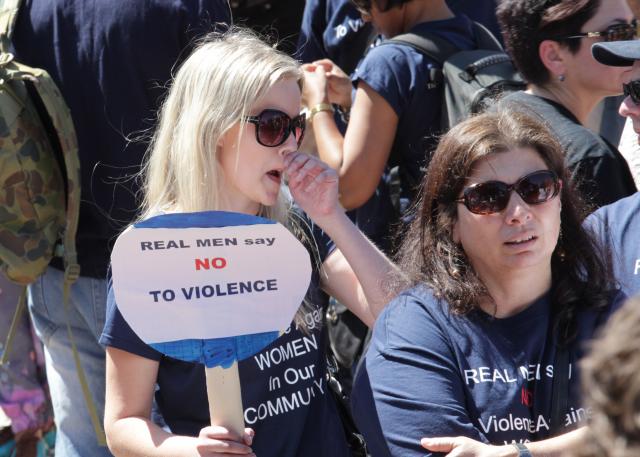By Danielle Galvin
In high schools across NSW and Victoria, The Man Cave facilitators ask the young men in front of them in their workshops who their biggest role models are.
The not-for-profit’s Head of Impact, Matt Defina, says it is very often their fathers, which might come as a surprise.
The Man Cave is described as a preventative mental health and emotional intelligence charity, with the aim of empowering boys to become great men.
“We started Man Cave in 2014, really because we saw the mental health and domestic violence statistics were not improving,” he said.
“We knew back then that one in five young men were suffering anxiety before the age of 18, suicide was the leading cause of death in young men, still is.
“And one woman a week was being killed by her partner through gender based violence and we thought we have to do something about this.”
As Mr Defina explains, every solution appeared too crisis-focussed, too “downstream” and there wasn’t enough being done to help guide teen boys intp what they call the “rite of passage” into manhood.
So they posed a simple question: what did we not have in high-school that we could have, that maybe would go some way towards prevention?
And from there, The Man Cave was born.
The first workshop was run at a Frankston secondary school.
“And after the workshop the teachers were like what did you do there? The halls are lit up, we have never seen the school like this before,” he said.
“That was when it was like, I think we are onto something.”
To date, the organisation has worked with 39,000 young men across Australia.
“That’s taking them through a full day transformational program that helps them drop in and feel safe,” Mr Defina said.
“It’s not a lecture, it’s not a presentation.
“We have 2-3 healthy male role models who are our facilitators that come in and run the program.
“They are all about sharing their own story of masculinity and then they create the space for the boys to talk with each other as well.”
The term toxic masculinity often comes up.
It can be used to describe the negative aspects of masculinity, perhaps the stereotypes of boys don’t cry, boys should man up and the ways that “manliness” can be used to assert dominance, aggression.
It is a broad, far-reaching term often used to describe the Andrew Tate’s of the world.
One of the key pillars of The Man Cave is to look at young men not as the problem, but as part of the wider solution.
“When it comes to toxic masculinity, the important thing in that space is that we don’t make all of masculinity wrong, that’s not the case at all, all we are saying, when there are certain parts of masculinity that are over emphasised then they can become really damaging,” he said.
“[It’s about] how do we give men the space to not just be in their masculine but to be more human which includes some of the softer side as well?”
There’s some important lessons they’ve learned along the way, since that first workshop in Frankston.
“The first thing is the statistics we are seeing are the outcome of something,” he said.
“They are the outcome of an internalised values or belief system that is to be a man, I need to be in control, I need to be tough and show no emotion, I need to be physically strong, I need to drink beer, I need to have lots of sex or at least be perceived to be having lots of sex, I need to be successful and earning lots of money.
“And so when young men internalise these belief system, and we’ve seen this in the Man Box study that was done in Australia by Jesuit Social Services about 5 years ago, their mental health rates are worse.”
The other issue that he sees is that young men aren’t provided with a healthy rite of passage into manhood.
The not-for-profit has some big goals in 2023 and beyond.
“We worked with 17,000 young men last year, the plan is to work with around 26,000,” he said.
They’ve have worked with over 1000 boys in the Pakenham area, including Beaconhills College, Haileybury College, Nossal High School and St Johns Regional College.”
This year, the organisation hopes to continue to grow and deliver more programs regionally.
They’re also conducting more work in the research space.
The organisation has been working on research asking young men for their views about key topics like Andrew Tate, gaming, vaping and so on.
Long-term, Mr Defina is hopeful every school in Australia will teach healthy masculinity in the curriculum.
To find out more about their research or programs, visit https://themancave.life/
**BREAK OUT BOX**
More about the Man Box study in 2018
The study, a Jesuit Social Service initiative, was published back in 2018 but still has some fascinating implications in 2023.
It focussed on the attitudes to manhood and the behaviours of young Australian men aged 18 to 30.
It involved an online survey of a representative sample of 1,000 young men from across the country, as well as focus group discussions with two groups of young men.
Key findings include:
– The majority of young men agree there are social pressures on them to behave or act a certain way because of their gender.
– 60% of respondents agreed or strongly agreed with the statement that “society as a whole tells me that a guy who doesn’t fight back when others push him around is weak”.
– Living up to the pressures of being a ‘real man’ causes harm to young men and those around them, particularly women.
One of the respondents in the focus group noted, quite aptly “men are just as emotional but don’t show it as much.”








